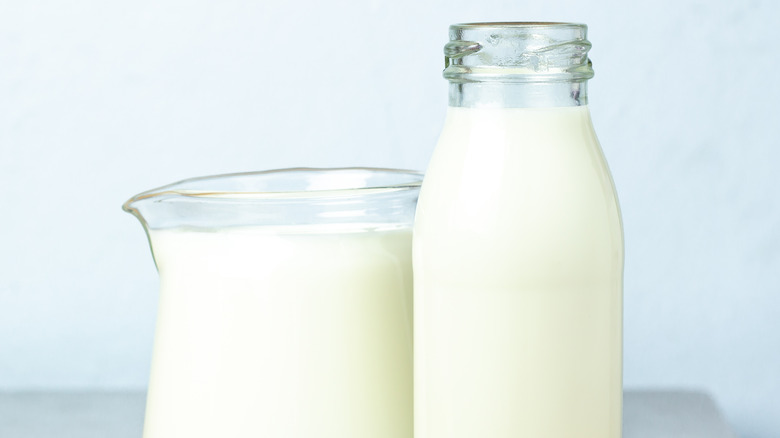What Is The Shelf Life Of Opened Heavy Cream?
It's always a bummer when food goes to waste. Tossing out moldy mushrooms or heads of lettuce past their prime no doubt leaves a bad taste in your mouth. Because of the hefty toll animal products take on the planet, it can feel even worse to throw out spoiled ground beef or a half-full carton of milk. Where heavy cream is concerned, however, you might be able to keep it open in the fridge a little longer than you expected.
While the USDA recommends only storing milk in the fridge for up to a week, pasteurized heavy cream can remain fresh for 10 days, per FoodSafety.gov. That shelf life extends even further when you're dealing with ultra-pasteurized heavy cream, which is what you typically find in the grocery store. Different from pasteurized cream, which has been heated to 161 degrees Fahrenheit for 15 seconds before being chilled, the ultra-pasteurized variety is heated to 280 degrees for two seconds. According to FoodSafety.gov's information regarding ultra-pasteurized whipping cream, which contains slightly less fat than heavy cream but is otherwise the same product, this simple alteration enables your cream to stay open in the fridge for up to a month.
Pasteurization kills harmful bacteria
Before the widespread use of pasteurization techniques, milk was responsible for 25% of all food-related disease outbreaks, according to the Virginia Department of Health. Bacteria coming from inside the cow (or from the environment in which it lived) was finding its way into raw milk, making people sick and increasing the rate of spoilage.
Fortunately, pasteurization remedied this. Heating the milk creates an environment that's inhospitable for most microorganisms, effectively deactivating or killing bacteria that could otherwise cause illness and spoilage. Because the process also includes rapidly cooling the milk or cream to less than 41 degrees Fahrenheit, pasteurization also prevents the growth of more bacteria.
While standard pasteurization is effective in killing most bacteria, some may remain, though not enough to warrant great concern. In the case of ultra-pasteurized cream, the extreme rise in temperature decimates virtually every microorganism. As such, the potential for bacteria to cause spoilage is greatly reduced. Because most cream isn't hermetically sealed, however — which would prevent bacteria from entering the container — spoilage tends to occur within a month, depending on the temperature of your fridge and how often you use the cream. Under ideal conditions, heavy cream may even last longer than a month, so remember to give it the smell test before tossing the carton.

